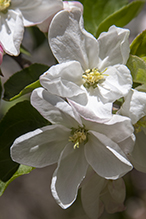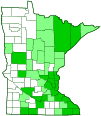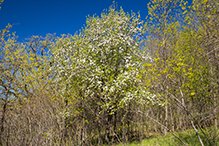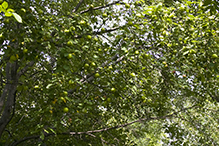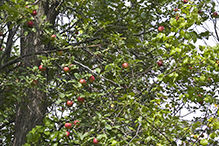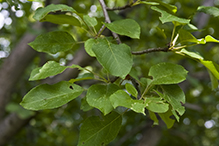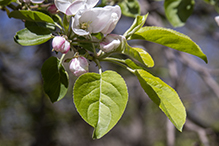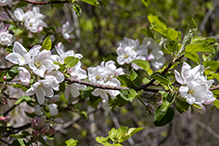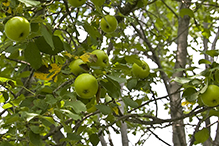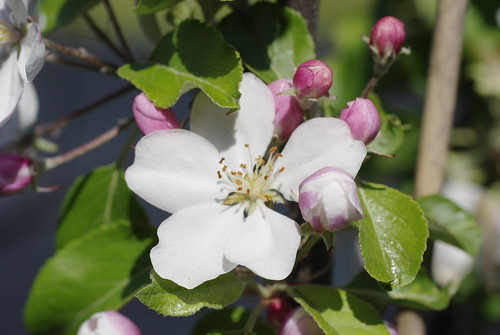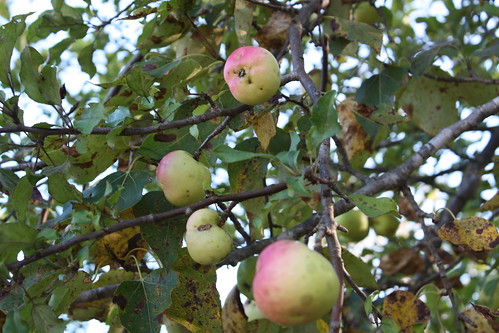paradise apple
(Malus pumila)
Conservation • Description • Habitat • Ecology • Use • Distribution • Taxonomy
Conservation Status |
|
|||||||
| IUCN Red List | not listed |
|||||||
| NatureServe | NNA - Not applicable SNA - Not applicable |
|||||||
| Minnesota | not listed |
|||||||
Description |
||
Paradise apple, also called common apple or just apple, is a small deciduous tree that reaches up to 50′ in height at maturity. The trunk is twisted. When grown in the open, the trunk divides near the ground into several major branches, and the crown is often as wide or wider than tall. When grown among other trees the trunk is taller and the crown is less spreading. Older branches on mature trees develop numerous prominent spur branches. The bark on young trees is smooth. On mature trees the bark is rough and thin, with a reddish inner bark and a gray, scaly outer bark. The twigs are moderately stout, brown to gray, and hairy when young. There are no thorns. The pith is solid and star-shaped in cross section. The leaf scars are narrow, slightly curved, and level with the twig or only moderately raised. They have 3 bundle scars. The buds are egg-shaped and are densely covered with whitish, woolly hairs. The leaves are deciduous, alternate, elliptical to egg-shaped, and 1½″ to 4″ long. They are entire, not lobed. They are rounded at the base and bluntly pointed at the tip. They are on leaf stalks that are densely covered with whitish hairs. The upper surface of the leaf blade is dark green and hairless. The lower surface is densely covered with whitish hairs. The margins are finely toothed. The flowers are large, up to 1¼″ wide. They appear after the leaves unfold in the spring. They are borne in umbrella-like clusters (umbels) on short, spur branches. There are 5 green sepals, 5 white petals tinged with pink, and 15 to 50 stamens with yellow anthers. The stamens are shorter than the petals. The fruit is a fleshy, globe-shaped to somewhat egg-shaped pome, 2⅜″ to 4⅓″ in diameter. Fruit of naturalized trees is smaller than fruit of those grown in cultivation because the latter are propagated by grafting. Naturalized trees produce fruit more than 1½″ in diameter. The fruit is green at first, turning yellow to red when it ripens in the mid- to late summer. The seed-bearing core or the pome is divided into 3 to 5 chambers. Each chamber normally contains 2 seeds. |
||
Height |
||
Up to 50′ |
||
Record |
||
No records are kept for non-native species. |
||
Flower Color |
||
White tinged with pink |
||
Similar Species |
||
The flowers are pink in bud but usually white when expanded, sometimes pink. Prairie crabapple (Malus ioensis) flowers are pink but sometimes fade to white. |
||
Habitat |
||
Roadsides, railroads, shores, fields, wooded areas. |
||
Ecology |
||
Flowering |
||
Late April to early May |
||
Pests and Diseases |
||
|
||
Use |
||
|
||
Distribution |
||||
|
Sources The counties in light green reflect citizen science sightings posted on iNaturalist. Some if not most of those include trees in people’s yards, which are not “outside of cultivation.” |
|||
| 5/24/2023 | ||||
Nativity |
||||
Native to eastern Europe. Introduced in colonial times. Widely cultivated. Occasionally escaped. |
||||
Occurrence |
||||
Uncommon Most occurrences of this tree outside of cultivation are probably the result of discarded apple cores by humans. |
||||
Taxonomy |
|||
| Kingdom | Plantae (green algae and land plants) | ||
| Subkingdom | Viridiplantae (green plants) | ||
| Infrakingdom | Streptophyta (land plants and green algae) | ||
| Superdivision | Embryophyta (land plants) | ||
| Division | Tracheophyta (vascular plants) | ||
| Subdivision | Spermatophytina (seed plants) | ||
| Class | Magnoliopsida (flowering plants) | ||
| Superorder | Rosanae | ||
Order |
Rosales (roses, elms, figs, and allies) | ||
Family |
Rosaceae (rose) | ||
| Subfamily | Amygdaloideae | ||
| Tribe | Maleae | ||
| Subtribe | Malinae | ||
Genus |
Malus (apples) | ||
| Section | Malus | ||
Some sources use the name Malus domestica for the apple tree. For other sources, the preferred name for both the cultivated and naturalized tree is Malus pumila. |
|||
Subordinate Taxa |
|||
|
|||
Synonyms |
|||
Malus communis Malus domestica Malus sylvestris Pyrus malus Pyrus pumila |
|||
Common Names |
|||
apple common apple paradise apple |
|||
Glossary
Pome
A fruit with a central seed bearing core enclosed in thick flesh, e.g., an apple or pear.
Umbel
A flat-topped or convex, umbrella-shaped cluster of flowers or buds arising from more or less a single point.

Visitor Videos |
|||
Share your video of this plant. |
|||
| This button not working for you? Simply email us at info@MinnesotaSeasons.com. Attach a video, a YouTube link, or a cloud storage link. |
|||
Other Videos |
|||
| Malus domestica Apple Trees gardenvilletv |
|||
About
Uploaded on Oct 24, 2010 Old mature apple trees, fruiting well |
|||
| MALUS DOMESTICA vladiraz |
|||
About
Uploaded on Apr 23, 2009 Apfelblüten am 23-April-2009 In Emmenbrücke |
|||

Visitor Sightings |
|||||
Report a sighting of this plant. |
|||||
| This button not working for you? Simply email us at info@MinnesotaSeasons.com. Be sure to include a location. |
|||||
| Carol Whittaker 9/29/2023 |
Location: New Hamburg Ontario Canada It has been growing beside my fence since I moved into my house eight years ago, never knew what it was until today. |
||||
MinnesotaSeasons.com Sightings |
|||||

|
Created: Last Updated: © MinnesotaSeasons.com. All rights reserved. |
